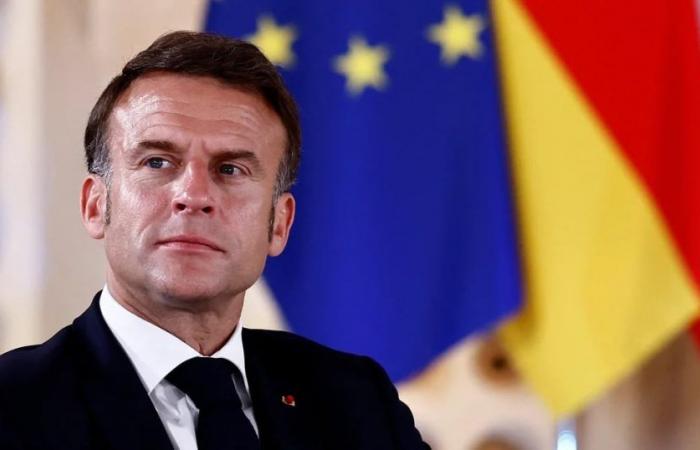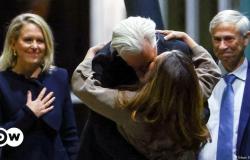Last Sunday’s European elections left two certainties: the advance of the right at the regional level, and strong impacts in France and Germany. In the case of the French country, the electoral setback was so profound that President Emmanuel Macron made the decision at the last minute of dissolve the National Assembly and call early legislative elections.
A maneuver that represents a last effort by the head of state to contain the advance of the extreme right hand in hand with Marine Le Pen.
Macron’s announcement from the Elysée came after the National Rally (RN), Le Pen’s party, won the elections with an advantage of almost 17 points over the ruling Renaissance party. Jordan Bardella, RN candidate, achieved a victory in all regions of France, except Paris. This victory demonstrated an unusual electoral reach.
Just an hour after the polls closed, the French president gave a national broadcast to announce the dissolution of Parliament. The first Minister Gabriel Attal, along with other close advisors, tried to dissuade him from taking such a measure. However, Macron did not give in and went ahead with his plan, considered by several analysts as a “game of chance”according to an article published by the magazine Foreign Policy. Others, meanwhile, accuse the president and leader of Renacimiento of “starting fires and then putting them out.”
The dissolution of Parliament has been seen five times in France since the founding of the Fifth Republic in 1958. The most notable case was that of Charles de Gaulle in 1968, who was forced to call elections due to the paralysis of his government due to student strikes and protests.
Macron had no obligation to dissolve Parliament, but he knew that the results of the European elections would leave him in a fragile position with three years left in his term. Robert Zaretskyauthor of the article Foreign Policy, considers that its decision to call early elections seems to be motivated by two main factors. First of all, due to exhaustion in the face of parliamentary paralysis. After the 2022 legislative elections, Renacimiento did not obtain an absolute majority in the National Assembly. For this reason, successive governments, first of Elisabeth Borne and after Attalthey had difficulties passing laws such as pensions and immigration.
In his article he also quotes the political scientist Bruno Cautreswho maintains that the decision to dissolve a parliamentary assembly “is anything but an anodyne act in democracy.”
The other factor that Zaretsky mentions is the intention of Macron of “forcing voters to confront the real possibility of a far-right government.” That is, giving the responsibility to voters to decide the parliamentary future until the end of their term.
“France needs a clear majority to move forward with serenity and harmony,” said the French president about his decision to advance the legislative elections.
Georges Danton, who played a decisive role during the French Revolution, said: “Audacity, more audacity, forever audacity, and the nation will be saved.” Zaretsky maintains that Macron is a leader who “takes pride” in making bold moves.
On his decision to call elections, which most observers consider to be a “risky bet”Macron himself explained that it is a political “clarification movement” to “avoid giving the keys of power to the extreme right” in 2027, alluding to the theoretical date of the next presidential elections.
According to Zaretsky, the head of state’s intention to surprise other political parties with his announcement worked. But, ironically, those who were not surprised by him were those of the National Group. In fact, before Macron’s national network, and after knowing the results, Bardella had urged the president to call early elections.
The announcement quickly sparked movements on the French left. The parties have shown signs of unification after the announcement, seeking to present a “Popular front” against the extreme right. Jean-Luc Melenchonmain figure of La France Insoumise (LFI), has managed to unite socialists, communists and environmentalists in a coalition that could consolidate a common front for the next elections.
In contrast, and despite the favorable electoral results, divisions are increasing on the right. Eric Ciotti, leader of Les Républicains (LR), suggested accepting an alliance with Le Pen’s National Rally, which generated an internal storm in his party. This proposal contradicts LR’s traditional stance against RN policies, and leading party members voted to remove Ciotti from his leadership.
Faced with this political scenario, leaders of both Le Pen’s and Macron’s parties have already begun to move to ask dissatisfied LR voters for their support ahead of the legislative elections.
Macron has been warning since 2017 that Le Pen and her party embody chaos for France, and he presents himself as the only barrier to extremism. However, since then this narrative has had the opposite effectallowing Le Pen to reposition RN in the French political spectrum.
Le Pen’s “demonization” strategy, on the other hand, was effective, purging the most radical figures from the party and changing its name, also leaving aside her father -Jean-Marie Le Pen-, who had repeatedly minimized the Holocaust.
For Zaretsky, Macron’s strategy aims to be the cure for the advance of the extreme right, but it runs the risk of ending up being the disease.
In his desire to attract conservative voters, the head of state went so far as to swim in the waters of the lepenism. One of the most resonant cases, which provoked strong criticism from the ruling electorate, was the approval of an immigration bill that denies certain social benefits to non-nationals, as well as automatic citizenship to their children born on French soil. Both clauses tacitly promulgated one of Le Pen’s old demands: the so-called national preference.
If the scenario of 1988 is repeated, when François Mitterrand cohabited with an opposition Prime Minister, the tactic could benefit Macron in the long term, according to Zaretsky. However, the French president’s declining popularity, evidenced by polls showing strong opposition to his leadership, calls into question whether RN’s exercise of power could discredit the latter or consolidate his influence.
Macron made it clear to the electorate that the vote will force the French to “assume their responsibilities.” The Renacimiento deputy also spoke along those lines. Cecile Rilhac: “Are you really sure you want to see our country governed by the National Rally?”
“I am confident in the ability of the French people to make the right choice for themselves and for future generations. “My only ambition is to be useful to our country, which I love so much,” the French president wrote on his social networks a day after the announcement.
Historically, European elections in France were used by the electorate to express general discontent with the government in power. For the political scientist Nonna Mayerthe function of these elections, especially in France, is offer a “sanction vote” to put politicians on notice.
Another factor to take into account for the legislative elections that will take place on June 30 (first round) and July 7 (second round), is that these regional elections attract fewer citizens to the polls than the national ones. Last weekend, almost half of the French population did not come to vote for the renewal of the European Parliament, so there is no broad statistical or behavioral base that would allow us to offer an accurate forecast for the legislative elections. A piece of information that could give the Government some hope. However, The most discouraging thing is the great advantage that the National Group took; advantage that could be extended even further if Le Pen gains the support of the majority of center-right voters.
The elections will coincide with the start of the Olympic Games. The results will determine whether Macron, an international ambassador for French republican values, will end up sharing the world stage with a National Rally prime minister. This fact could redefine the political landscape not only of France, but also of Europe.






